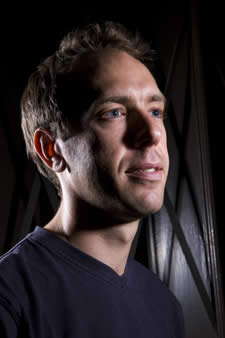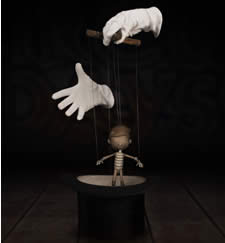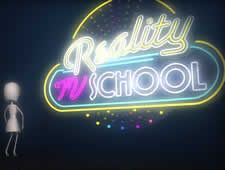
Chris Atkins
Do you like to keep in touch with the latest news and gossip? How sure are you that the things you read in the newspapers and see on TV are true? Starsuckers is a documentary that takes a sharp look at the dodgy goings-on behind the headlines. I caught up with its director, Chris Atkins, to find out how he got the story behind the stories.
Last time I spoke to Chris he had just finished work on Taking Liberties (read that interview here), which investigated the recent erosion of civil liberties in the UK, and he told me that making it had inspired him to carry on working on political documentaries. Given that, I asked him what drew him to this particular subject.
“I felt that the message in Taking Liberties was inevitably simplified,” Chris says. “Not all of the subject was there. I didn't have room to go into the media's involvement. The likes of The Sun and The News Of The World are partly responsible for creating this climate of fear and giving the impression that there are terrorists everywhere and we're all going to die and, basically, I didn't think they got enough of a kicking.
“Also, there was this thing where the company that distributed Taking Liberties kept asking us to put more famous people in it. It was ridiculous because it was supposed to be a documentary about ordinary people - but they had this list of celebrities like Tracy Emin, Vernon Kaye and Prince Philip and they said if we could fit them in somewhere then they would give us more money to distribute it. That was the tipping point for me. I decided I wanted to do something about the media and celebrity culture and how it shapes what we see and hear.”
The film has already attracted a lot of attention on the internet but everybody seems to be focusing on its investigation of tabloid newspapers - isn't it really about wider concerns?
“Absolutely,” he agrees. “It's ironic, of course. It's made a much bigger splash than Taking Liberties because it has celebrities in it, so has it been mis-sold? Taking Liberties got lots of worthy reviews but it wasn't much talked about. It had a worthy subject but not many people knew it existed. So I went at this one the other way round and now I suppose I'll always be known as that guy who invented the story about Amy Winehouse's hair going on fire.
“There is a lot more too this, though, like the stuff about the negative influence the media has on children. That was what really shocked me and got to me the most, because there's no debate about it at all – everybody agrees that children watching six to eight hours of TV a day is incredibly damaging. We went to a lot of schools to ask about what children thought of celebrity culture and it was really sad to meet kids who wanted to be famous because they thought that then their parents would love them more.
“I asked one kid when he'd last had a family meal where everybody sat down around the table together, and he didn't know what I meant because he never had. He'd just go through and get his food and then sit down in front of the telly. And there's a generation that's grown up like that now. I don't blame the celebrities themselves, especially the younger ones, because that's what they've grown up with.”
So is he interested in the way this has affected the political process as we see more celebrity politicians?

“The connection between celebrity and politics isn't overly new,” he cautions. “It's a question of degree, and I tried to illustrate that it's been a gradual process. I mean, we had Reagan and Schwarzenegger, but then Tony Blair brought celebrity into politics in a different way. And what we've done in this film that nobody's done before is look at the overlap between celebrity, politics and charity, the way that celebrities become charity spokespeople.
“There's been this notion that you can't attack charity and I didn't know how Starsuckers would go down, doing that, but then at its very first public screening there were some people from Make Poverty History and they were really pleased, they said they'd been waiting years for somebody to talk about this, like the problems with the Live 8 concerts.”
These, he says, were another thing which he found personally shocking.
“I'm a massive Pink Floyd fan,” he explains, “and I was naïve about that, I really enjoyed the concerts and thought they were great. But my researcher really opened my eyes, showing how the concerts had been a big distraction from what was really going on at the G8 summits, and how little of the money had ever actually reached people in need. And that story had never been told. People had tried to talk about it in TV documentaries but had been repeatedly shut down.
“The other thing we did that was really new was to go undercover in the tabloid newsrooms and look at the way the hacks do their job. People had been trying to get permission to do a documentary like that for years but it was clear it would never happen. The traditional approach is that going undercover is justified if it's the only way of getting the story and it's in the public interest. These people make a living out of doorstepping other people but they have no accountability themselves. A lot of what they do is just entrapment – things like the fake sheikh case and red mercury, which doesn't exist, all the big court cases associated have collapsed because of entrapment. And people like Rebekah Wade are never actually interviewed at all.”
Chris has managed to get some impressive interviews for this film, though – notably with the famous publicist Max Clifford. However, a lot of stuff was bleeped out of that. Was this for legal reasons?
Chris says that the Max Clifford thing was odd, but that it was one area where he and his lawyer were in complete agreement. “He was coming out with some hair-raising stories but there was just no way we could substantiate them. He could have been making them up or just rambling, I don't know, but I think I could quite fairly have been burned alive if I'd included all that and people had then gone to see the film just because of the celebrity gossip.”
So how should less scrupulous media outlets be dealt with? He thinks the Press Complaints Committee is a big joke.
“With the recent Jan Moir article about the death of Stephen Gately, there were something like 20,000 complaints, but the person they went to, the person in charge of that part of the PCC, is Paul Dacre, and it was his newspaper that ran the story! I think we should just get rid of the PCC altogether – and there's a strong case for that, for just being open about being a country that has an unregulated press – or we should make it an independent body.

“Definitely not a government body, but a public one. At the moment it's controlled by the press themselves and it's a sham. Editors pretend to have sleepless nights about it but they know it'll always rule in their favour. It's like having Mugabe sitting on his own war crimes tribunal.”
Making a film like this must be a good way to make powerful enemies. Has he been harassed by reporters himself since it came out?
“They tried to doorstep me,” he says, “but they went to the wrong house. It was a place I used to live – now that is sloppy journalism. I mean, I've had a few phone calls, I've obviously pissed them off, but what it comes down to is that I'll deal with that because I don't want to live in the sort of society where I can't say these things. Still, in six months or so you might well see something lurid about my private life splashed across the front of the Sunday papers.”
He's clearly invested a lot in this film. Is he planning to take on another big political topic?
“I'd like to do something smaller and simpler next,” he says, though he's still looking for the right project. “I spent two years on this and I wasn't being paid during that time. It was exhausting and I ran up colossal debts, so I'd rather not go straight into another thing like that. I think my next film will be a bit less in your face.”
Whatever it is, the attention already being attracted by Starsuckers suggests it will be eagerly received.
Starsuckers is out across the UK now. For more information about the film, visit the official site





















